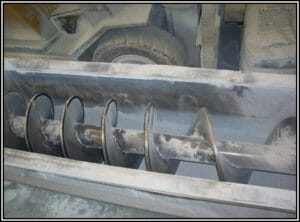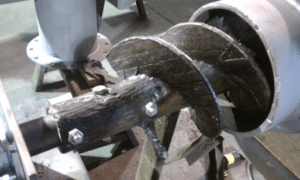Conveying Abrasive Materials
Screw conveyors and feeders are great choices for conveying and feeding a wide variety of powder bulk materials. Applications can vary from conveying feed and grain at a feed mill to feeding potash out of a storage silo. Some of the more challenging applications involve conveying and feeding abrasive powder bulk materials. Abrasive materials can range from soy beans to sand to fertilizer to minerals to potash. Each of these materials poses some unique challenges for screw conveyors and feeders. This article will discuss some of the options for fighting abrasion, along with their associated costs and wear resistance. These options are in some order of recommendation and as always, the thicker the steel the better when fighting abrasion, no matter which of these options is chosen.
Many of the screw conveyor components available on www.screwconveyorparts.com can be made of an abrasion resistant material and are available to ship in about a week. Send your request to [email protected]for pricing and lead times for abrasion resistant screw conveyor components and replacement parts.
The Good
Carbon Steel – Cost: $, Wear: 1 – Carbon steel (A36) is the most common type of material of construction for screw conveyors and feeders. These parts are economical and available for immediate shipment. With a hardness of around 100 BHN, carbon steel is a good choice for most mild abrasive materials.
Heavy Carbon Steel – Cost: $-$$, Wear: 1.5 – Heavy carbon steel (A36) are thicker carbon steel parts from 3/8″ thk and up. These parts are still economical and some are available for immediate shipment with many being able to be fabricated in a couple of weeks. With a hardness of around 100 BHN and more material to wear, heavy carbon steel is a good choice for most mild to moderate abrasive materials.

The Better
AR200 Series Steel – Cost: $$$, Wear: 2 – AR200 is an abrasion resistant steel with a hardness around 200 BHN. AR200 has similar workability as carbon steel, is easily sourced and economically priced. Many times, the premium to go to AR200 over a made to order heavy carbon steel part is minor. AR200 parts are not stocked but can be made to order in a couple of weeks.
The Best
AR400- Cost: $$$$, Wear: 4 – AR400 is an abrasion resistant steel with a hardness around 400 BHN. AR400 is much harder to work with than AR200 or carbon steel, is readily available and holds a high premium to buy and fabricate. In addition to AR400 material costing more, there is usually additional labor to specially design, form and weld which lead to slightly longer lead times than the above choices. AR400 is 4x harder than carbon steel and 2x harder than AR200, meaning it should have about the same factor of life against abrasive materials. It is worth mentioning AR500, which is similar to AR400, except slightly harder, more expensive and harder to source.
Trough Liners- Cost: $$-$$$$, Wear: 2-4 – Using an AR material and lining the trough is a cost effective way to create a long-term, replaceable wear liner system for a trough. Trough liners are welded or bolted into the bottom of the trough where the material slides and causes the most wear. As the trough liner wears it can be removed, usually without removing the screw, and replaced to extend the life of the screw conveyor trough.
Weld on Hard Surfacing- Cost: $$$$$, Wear: 6 – Weld on hard surfacing involves using a very hard weld wire and then applying it to the flights, and sometimes pipe and trough. There are a number of different weld wire alloys used by manufacturers and all are very effective for fighting abrasion. Typical thicknesses of the hard surfacing are 1/16″ – 1/4″. This process is very time consuming and therefor the cost and lead time of these parts reflects this. Parts with hard surfacing are the only choice for many highly abrasive applications, such as roofing granules.

Worth Noting
There are a few other options for abrasion resistance. Although less common and/or cost prohibitive for most budgets these are some options seen in specialty applications.
Ceramic Tile- Cost: $$$$, Wear: 6 – Ceramic tile can be bonded to the troughs and vacuum bonded to the flights for superior resistance against sliding abrasion.
Spray on Coating- Cost: $$, Wear: ?? – There are a variety of spray on coatings available. The cost is not prohibitive, but the successful experience with these coatings is limited.
Stainless Steel- Cost: $$$, Wear: 2 – Stainless steel has the ability to work harden, meaning it will get harder with more impact. Stainless steel liner systems are popular in the feed and grain industries, but have been used with limited success for wear abrasion in other industries.
Poly Liners – Cost: $$, Wear: 3 – There a variety of UHMW liners available, with the most common being Virgin UHMW and ceramic embedded polyurethane. Like AR liners above, this material can be bolted in to offer a replaceable screw conveyor trough liner system.
Different Grades of Carbon Steel – Cost: $$, Wear: 2 – The most common grade of carbon steel is A36, but other, harder, grades are available to help fight wear. Grades such as A514 have a hardness of over 200BHN and have good availability.

